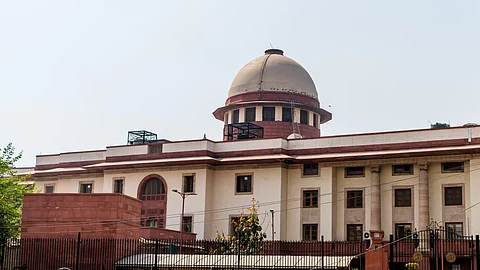

THE SUPREME COURT OF FRIDAY directed a trial court in Karnataka to reconsider, within two weeks, a petition by the Dharmasthala Temple administration seeking to block publication of allegedly defamatory reports in connection with the Dharmasthala mass burials case. The plea in the top Court was challenging a recent Karnataka High Court order that lifted a media gag on the controversial Dharmasthala mass burial case, which has triggered intense online coverage and defamation claims.
A bench of Justices Rajesh Bindal and Manmohan questioned whether a media gag was justified in the circumstances.
How the case came about
The burial case itself stems from allegations made by a former sanitation worker at the Dharmasthala Manjunathaswamy Temple, who told police that he had been compelled by his supervisors to bury numerous bodies, including those of women, over a span of nearly two decades. While the complaint did not name any specific individuals as accused in a crime, the revelations prompted public outcry, sustained media coverage, and sharp online debate.
In view of the seriousness of the allegations, the Karnataka government has set up a special investigation team (SIT) to probe the matter.
The petition before the Supreme Court has been filed by Harshendra Kumar D, Secretary of the Dharmasthala Temple administration, challenging the High Court’s August 1 order that had quashed an earlier gag directive issued by a Bengaluru civil court.
The trial court had restrained media organisations from reporting on the alleged murder and burial of women near the Dharmasthala temple in Karnataka’s Dakshina Kannada district.
The sweeping gag order had directed nearly 390 media outlets and digital platforms to remove close to 9,000 online links, videos, and articles that were allegedly defamatory and damaging to the temple’s reputation.
The civil court passed the order in response to a defamation suit filed by Kumar, who claimed that the online content was baseless and maligning the temple and its managing family without any specific allegations against him or the temple authorities in any FIR.
SC had earlier declined to entertain a challenge to the sweeping gag order
On July 23, the Supreme Court had declined to entertain a petition filed by YouTube channel Third Eye challenging a sweeping gag order issued by a Bengaluru civil court. That local court order, passed in a defamation suit filed by Dharmasthala Temple secretary Harshendra Kumar D, had restrained nearly 390 media outlets from reporting on matters connected to the brother of Dharamadhikari D Veerendra Heggade. It also directed the removal of close to 9,000 links and stories from various platforms relating to the Dharmasthala burial case. The top court, however, gave liberty to the petitioner to approach the Karnataka High Court.
“Prior restraint on publication an extreme measure”: Karnataka HC
On August 1, the Karnataka High Court set aside that gag order, terming it unsustainable. The High Court noted that prior restraint on publication is an extreme measure permissible only in exceptional circumstances and found no compelling justification for such a sweeping curb on media reportage in the present case. This quashing of the gag order prompted Kumar to move the Supreme Court once again, this time seeking restoration of reporting restrictions and removal of what he described as defamatory online content targeting the temple management.
On Thursday, CJI Gavai agreed to list the matter
A bench headed by Chief Justice of India, Justice B.R. Gavai agreed to list the matter for Friday after an advocate appearing for the petitioner sought an urgent hearing, citing the rapid spread of alleged defamatory content. “Around 390 YouTube channels are running defamatory material against the Dharmasthala temple,” the counsel submitted during the mentioning.
The CJI responded, “I think it’s already listed for tomorrow.”
“Social media channels circulating defamatory content day after day”: Senior Advocate Mukul Rohatgi
On Friday, senior advocate Mukul Rohatgi, appearing for the temple administration, told the Court that television channels and social media platforms were “day after day” circulating defamatory content, and even displayed to the bench certain internet memes which he said targeted the temple and its management.
While doubting the necessity of a gag order, the bench of Justices Bindal and Manmohan made it clear that “any observations made by the High Court shall not influence the trial court while entertaining the application for stay afresh.”